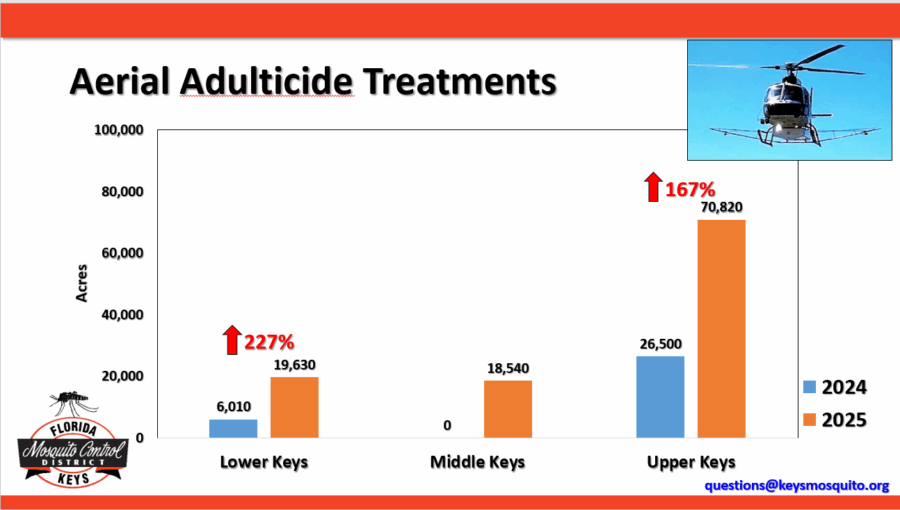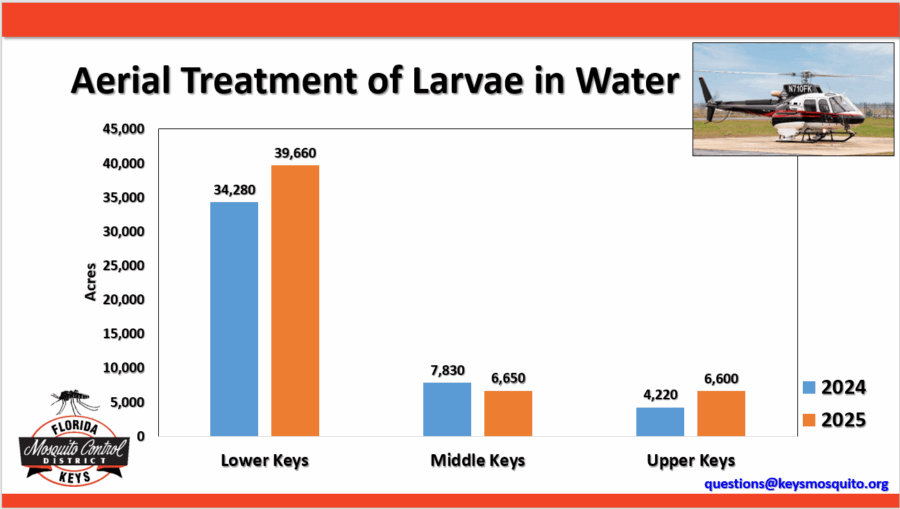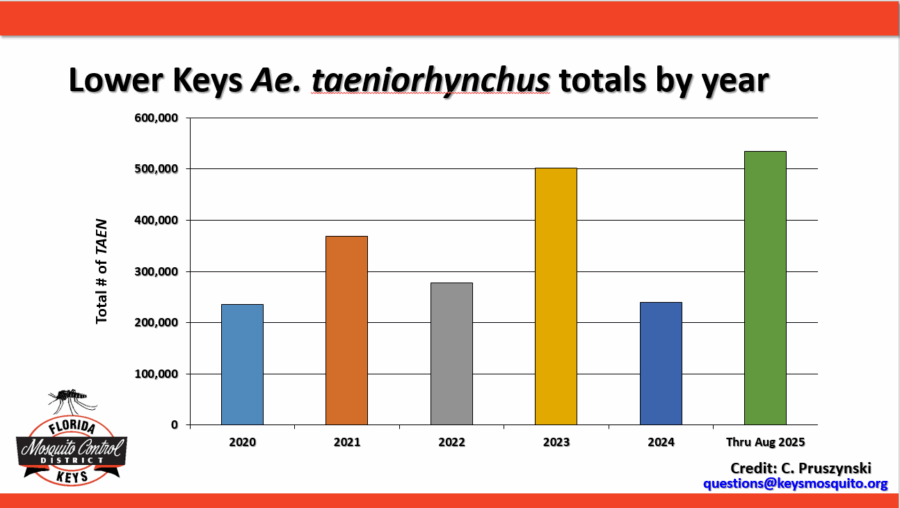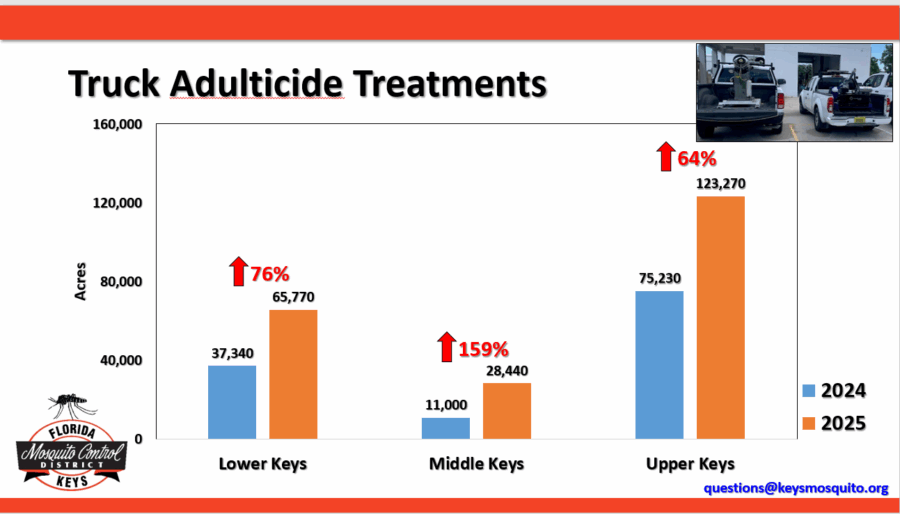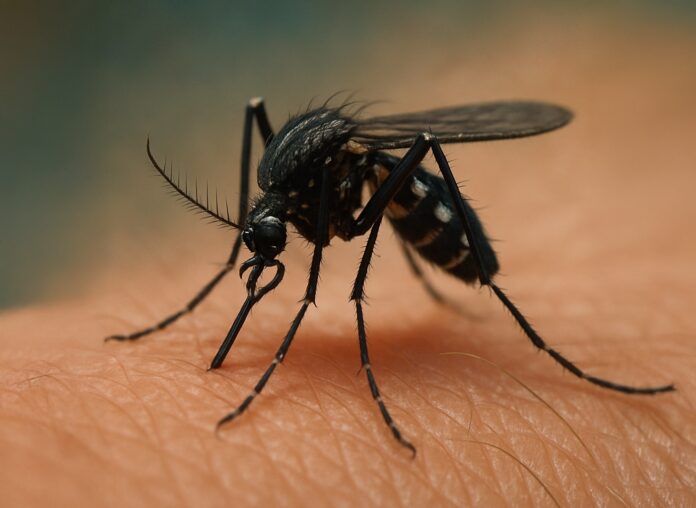
The Florida Keys Mosquito Control District held a series of public meetings from Sept. 15 to 17 in Key West, Marathon and Key Largo to address the recent surge in saltmarsh mosquito populations. Residents had the opportunity to learn about the challenges the district has faced this summer and get questions answered.
This past year, the Keys have experienced an unusually high number of saltmarsh mosquitos, a significant nuisance with their persistent bites.
During the sessions, officials revealed that this species, Aedes taeniorhynchus, makes up a remarkable 83% of the 45 mosquito species found in the Keys. These resilient insects have been documented as far as 66 miles out to sea and at altitudes of up to 500 feet. Officials also noted that these pests can transmit heartworms to animals, so it’s recommended that pet owners ensure their animals are on preventative medication.
Despite a global rise in mosquito-borne diseases in humans, the Florida Keys have remained remarkably free of such illnesses, mosquito control officials said. And saltmarsh mosquitoes aren’t known to be disease vectors for humans like their Aedes aegypti cousins.
But according to operations manager Mikki Cross, four major challenges are contributing to the rising mosquito numbers.
“One of the biggest issues has been the weather,” she said. “High winds and heavy summer rains have led to frequent mission cancellations and created an abundance of standing water. This has provided ideal conditions for the saltmarsh mosquito, whose larvae can develop into biting adults in as little as one week, significantly boosting their population.”
Topographical changes also present a challenge for the district. A combination of sea level rise, rainfall and tidal activity has created new breeding sites for mosquitoes. Wind direction has been a major factor as well. The varying winds are conducive for mosquito migrations, often blowing the insects out of treated zones and into areas that have already been sprayed. This is compounded by the fact that the district is legally prohibited from treating a number of protected lands. While the agency can effectively treat specific areas, these untreated sanctuaries allow new mosquito populations to thrive and be carried by the wind into populated areas.
To counter this, the agency is implementing several new strategies, including advanced mapping tools to pinpoint these areas more effectively. The district has also begun earlier reconnaissance missions to identify and treat breeding sites before they become a major problem and is in the process of revisiting its long-term management plans.
A new treatment notification app, available for download on iPhone and Android, allows residents to receive alerts for scheduled helicopter and truck sprays in their area and view detailed maps of both recent and planned treatments.
In response to questions from concerned citizens about more organic methods for mosquito control, such as introducing more dragonflies or bats, director of research Larry Hribar provided a detailed explanation.
“It’s a common misconception that we can simply introduce more dragonflies or bats to solve our mosquito problem,” said Hribar. “The reality is much more complex. Dragonflies, while they do eat mosquitoes, are also highly territorial and even cannibalistic. If we were to release them in large numbers, they’d simply end up eating each other instead of making a significant dent in the mosquito population. As for bats, they’re not a silver bullet either. While they will eat mosquitos, their diet is incredibly diverse and they much prefer larger, more calorie-rich insects like moths and beetles. We’ve seen in past experiments, even here in the Keys, that bats won’t just stick around and eat what we want them to; they’ll follow their natural instincts and forage for a wider variety of prey. It’s not a reliable or effective method for the kind of widespread control we need to protect public health and comfort.”
For residents seeking assistance with mosquito issues, service requests can be submitted directly through a form on the agency’s home page. For general inquiries, residents can email questions@keysmosquito.org. Information on the district’s approved products and control methods is at www.keysmosquito.org.












